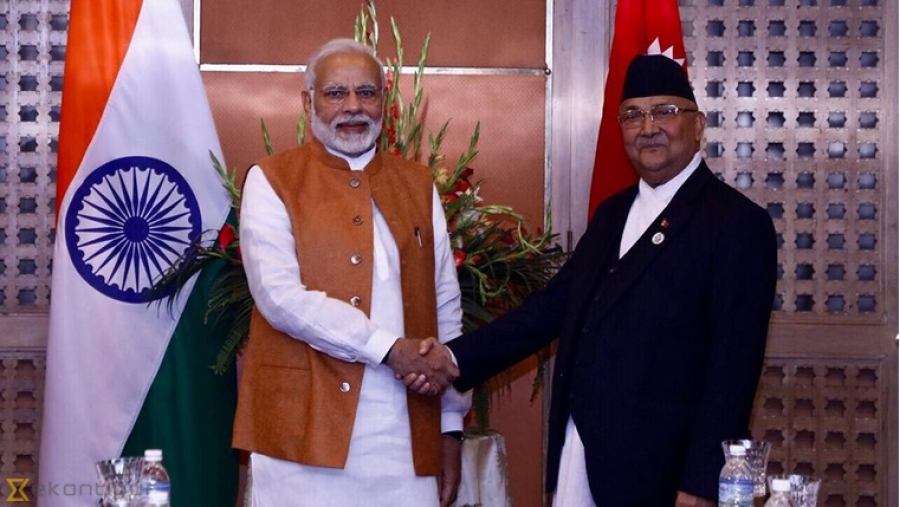Politics
Work division in New Delhi won’t affect Nepal-India ties: Oli
Prime ministers Oli and Modi discuss ways to strengthen bilateral relations.
Anil Giri & Suresh Raj Neupane
Prime Minister KP Sharma Oli has said that the appointment of key ministers in the Indian government will not affect Nepal-India ties amid widespread intrigue in the country—on and off social media—over Indian Prime Minister Narendra Modi’s decision to appoint Subrahmanyam Jaishankar as the new external affairs minister.
Jaishankar, a career diplomat of the Indian Foreign Service, visited Nepal in the first week of September 2015 as the special envoy of Modi and had urged Nepali leaders to postpone the promulgation of the new constitution to address the grievances of the country’s marginalised groups. Relations between the two countries went sour after major political parties ignored New Delhi’s suggestion. India subsequently imposed a border blockade at the southern border that lasted six months.
In an interview with the India Today on Friday, Oli, when asked about the new role of Jaishankar, an accomplished diplomat, the prime minister said that Nepal’s friendship is not limited to, or defined by, particular individuals but it’s with the government and people of India.
“Composition of Indian Government is totally India's business and not of other countries; it is not a matter of interest for Nepal. I believe whoever takes whatever portfolios won't affect the Indo-Nepal relations.”
Oli returned to Kathmandu on Friday afternoon after attending the swearing-in of Modi as prime minister for a second term. On Friday morning, the two prime ministers had a meeting.
An expert on China and the United States, former foreign secretary Jaishankar, 68, is widely seen as a troubleshooter. He played a key role in resolving the crisis following the incursion in Ladakh's Depsang and the Doklam stand-off, handling the tough negotiations with Beijing.
Oli said that Nepal’s misunderstanding with India was resolved gradually. In the beginning of Modi’s tenure, there was some misunderstanding but the two sides resolved issues through genuine efforts.
“The relations came back on track. After that multidimensional friendly ties between India and Nepal have been developed,” Oli said.
According to Rajan Bhattarai, the foreign relations adviser to prime minister who was a member of Oli’s team, told the Post that an environment of trust has been built at the political and public levels and the two leaders had agreed to give continuity to it.
Oli and Modi held talks for half-an-hour at Hyderabad House on Friday. The two leaders are said to have briefly touched upon matters related to mutual interest and deepening the ties. Both the prime ministers agreed that Nepal-India ties were heading in the positive direction. “Both of them agreed to continue with this spirit,” said Bhattarai.
The border blockade had put the Nepal-India ties at their lowest ebb. With exchanges of high-level visits, there were attempts from both sides to mend the ties. Three prime ministers of Nepal—Oli, Sher Bahadur Deuba and Pushpa Kamal Dahal—visited India to improve the relations while Modi visited Nepal four times in the five years since his first election.
Pending bilateral issues will be sorted through talks, said Bhattarai. Nepal and India have several mechanisms at different levels to discuss bilateral issues concerning trade, commerce and security, among others. According to the Nepali Embassy in New Delhi, the two prime ministers expressed their commitments to taking bilateral relations to a new high.
On behalf of the government and people of Nepal, Oli congratulated Modi on his assuming office for a second term and the Bharatiya Janata Party and the National Democratic Alliance on their spectacular victory in the recently held Lok Sabha elections.
Both the prime ministers expressed happiness at the progress made in Nepal-India relations under their watch, the embassy stated. The two leaders are said to have underlined the importance of regular high-level visits between the two countries in order to advance cooperation in all areas of mutual benefit.
Oli also extended President Bidya Devi Bhandari’s invitation to Ram Nath Kovind, the President of India, for a state visit to Nepal. Oli also invited Modi to pay a visit to Nepal, which the prime minister accepted and pledged to visit the country at a convenient time.
In the interview with India Today, Oli said that the South Asian Association for Regional Cooperation should be revived. Due to the longstanding rivalry between India and Pakistan, the SAARC process has stalled.
Oli said, “PM Modi feels we face common problems and share a common future, so collective effort is needed to face the challenge of time and to meet our goals.”




 9.83°C Kathmandu
9.83°C Kathmandu















